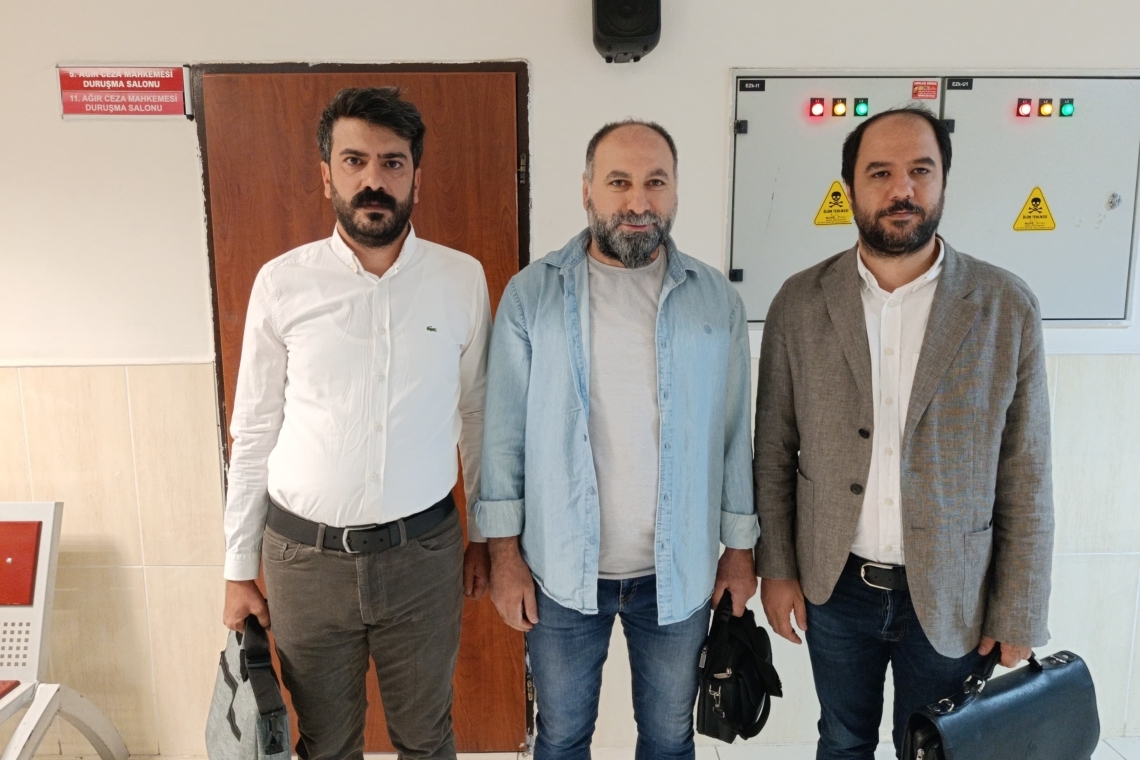Deniz Tekin
A café owner in the southeastern Turkish city of Diyarbakır appeared in court on Tuesday after being charged with making "continuous terrorist propaganda" for announcing that his business would serve customers in Kurdish. Ramazan Şimşek, who was detained in May and held under house arrest for six months, rejected the accusations, saying the case targets the Kurdish language itself.
“This prosecution and these charges are not directed at me personally but at the Kurdish language,” Şimşek said during his defense statement at the first hearing of the trial held at Diyarbakır 5th High Criminal Court. He spoke through an interpreter in Kurdish. “I came under pressure because I wanted to provide service in Kurdish in my café. This is not a humane situation. Every person, every society exists through its language.”
Şimşek faces up to 7.5 years in prison. The charges stem from his decision to announce, shortly after Kurdish Language Day on May 15, 2024, that Pîne Café, which he operates in Diyarbakır’s central Yenişehir district, would only serve customers in Kurdish. Following a wave of threats and online backlash, Şimşek was detained by police during a raid on May 29 and later released under house arrest, which was lifted six months later.
“Multilingualism is a richness of society”
In his court appearance, Şimşek emphasized the widespread use of Kurdish in Diyarbakır, a majority-Kurdish city in Turkey’s southeast, and criticized what he described as a broader intolerance toward the Kurdish language. “There are places in Turkey where only English or French is spoken, and speaking Turkish is forbidden. We never banned Turkish. I made this decision because Kurdish is being spoken less and less. My aim is to protect the Kurdish language. Defending the Kurdish language is defending democracy. There is no democracy where there is only one language,” he told the court.
Şimşek firmly denied the charges of making propaganda for the outlawed Kurdistan Workers' Party (PKK), which has waged a decades-long insurgency against the Turkish state. The group is designated a terrorist organization by Turkey, the U.S., and the EU.
“The claim that I have ties to the PKK or that I made propaganda is a forced interpretation,” he said. “May 15 is celebrated as Kurdish Language Day by all Kurds. I didn’t make propaganda; I simply stood up for my language. I have no hostility toward the Turkish language. I just want my language to be spoken freely. Those who ban Kurdish are not considered nationalists, but when I defend it, I’m accused of nationalism and racism. This is ironic.”
He also stated that he was unaware the books seized from his café were under a court-ordered ban.
Defense lawyers argue legal process violated rights
His lawyer, Mehdi Özdemir, noted that Şimşek had been subjected to a targeted campaign on social media following his announcement, and that public complaints triggered the investigation. He said prosecutors changed the accusations against his client three times during the investigation phase and argued that the legal proceedings reflect intolerance toward Kurdish and a broader erosion of legal protections.
“This judicial threat must end, and he should be acquitted,” Özdemir told the court.
Another attorney, Yakup Güven, stressed that Şimşek did not prohibit any language in his café, but rather sought to promote Kurdish. He referenced the Treaty of Lausanne, which Turkey signed in 1923, noting that it guarantees the right of citizens to use their mother tongue in private businesses. “My client is under legal threat for trying to preserve his own language,” Güven said.
The prosecution requested time to review the case file and prepare its final opinion. The court granted the request and adjourned the trial to Nov. 13.
Background of the case
On May 15, 2024, Kurdish Language Day, Şimşek declared that his café in Diyarbakır’s Sanat Street area would provide service exclusively in Kurdish. Following widespread attention and threats on social media, the Diyarbakır Chief Public Prosecutor's Office launched an investigation, initially on the grounds of "being a member of a terrorist organization through continuous acts."
He was detained during a police raid on May 29, held for two days, and then released under judicial control with a house arrest order. The restriction was lifted six months later, on Nov. 29, 2024, after his lawyer’s appeal.
In the indictment prepared by the Diyarbakır Chief Public Prosecutor’s Office, Şimşek is accused of aligning his Kurdish-only service policy with a day symbolically significant to the PKK and its affiliated structures, including the Kurdistan Communities Union (KCK). The indictment also cited the use of the word “Kurdistan” in music lyrics shared on the café’s social media account and the presence of publications with court-ordered bans in the café as further evidence of alleged propaganda.



